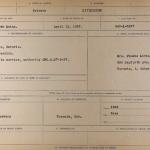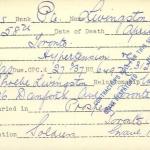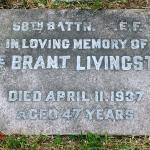BX June 7, 1916
A Narrow Escape
Police Magistrate W.C. Livingston this morning received word from his son, Pte. Brant Livingston, of the 58th Battalion. Pte. Livingston, who was at the time of writing last month, in good health, recently engaged in several severe conflicts with the Germans at close quarters but fortunately escaped serious injury. One thrilling instance he related occurred when his platoon, which was in the support trench, was ordered to the fire line trench to support the men’s comrades, who were hard pressed. His captain and eleven other men in a body had to charge across an open space, the communication trenches having been blown to pieces by German shell fire. Of the eleven men only four reached the front trench alive. The captain was shot directly in front of Pte. Livingston who was, he stated, spattered with blood and brains. After a fierce struggle the Germans were forced to retire.
BX July 3, 1916
A Hot Time
Magistrate Livingston has received a letter from his son, Brant, with the 58th Battalion, telling of the hot times the Canadian troops have had on the firing line. For three weeks he stated, he had not had his boots off, so busy were they kept. He had engaged in a bayonet charge and accounted for three Germans by the cold steel route, finding that the Germans did not like the taste or even the appearance of British cold steel. Arthur, another son, with the P.P.C.L.I., is now in the trenches in France.
BX October 10, 1916
Miraculous Was Escape of Pte. Brant Livingston – Was Caught in Shell Hole by German Shell, His Two Comrades Being Killed While His Hip Was Penetrated – Stretcher-Bearer Killed as He Was Being Taken to Dressing Station.
“Miraculous” alone describes the providential escapes from death which befell Pte. Brant Livingston, son of Police Magistrate Livingston, who now lies wounded in the War hospital, Warren Road, Guildford, London, England, with a hole through his thigh, caused by a German shell fragment. Lying in a shell hole in a newly captured section of the German line, Private Livingston received his wound by the explosive shell which killed the other two occupants of the crater, while when he was on his way back to the dressing station by stretcher; the leading stretcher-bearer was killed by another shell. He is cheery even with his severe wound, stating that he considers that even if he be crippled for life he was very fortunate in escaping with his life.
He was in the shell hole waiting for six o’clock a.m. to come to take part in the Canadians’ first charge in the Somme. He missed the charge but his brother Arthur, who is with the Princess Pat’s, went through the dash without sustaining even a scratch. Writing home, Private Brant Livingston said, in part:
September 24, 1916
Well here I am in “Blighty” at last. No doubt you will have received this official notice that I had been wounded. I hope you had not worried yourselves any on my account. I told you once not to pay any attention to those official telegrams until you heard from me.
Believe me, I had it close enough. This is how it all happened. We were taking up our position in the Somme for the first time and we effected the relief O.K. about 7 p.m. on September 16. We had to advance through a terrible curtain of fire which Fritz continually puts up. As all the trenches have been battered up, there is nothing left but shell holes, and we connect these by digging a narrow trench from one hole to another. We were nearly all dug in by 11 p.m. and as we were to make a charge at 6 a.m. we were using the time as best we could in swapping yarns, smoking and one thing and another. Sleep was entirely out of the question, with the shells bursting all around. Our platoon had suffered pretty heavily and I got mine about midnight. A shell lit right in the hole I and two other lads were in. I was blown about 15 feet in the air, and came down flat on my back. A piece of the shell passed through my hip, bone and all, and it left me down and out. The other two boys were both killed outright. Our platoon stretcher-bearers gave me first aid and then I had to wait in another shell hole for a stretcher to take me out. I only had to wait about three-quarters of an hour till a couple of French lads undertook to get me to the dressing station. I will never forget my experience in getting out that night. We had to go right through the curtain of fire, right out in the open. A large shell burst just in front of us, and killed one of the lads who was carrying me, and it was hell. I never expected to get out at all. We got another lad to help us on our way and we eventually reached the dressing station at 3 a.m.
I had my wound dressed and was then put on the hospital train for Etaples, where I underwent the X-rays and two operations, nearly passing out there, as I had two hemorrhages on the operating table. The medical officer who was looking after me said that by all the laws of human nature I should have died. My constitution saved my life. It was the closest call I have ever had, but a miss is as good as a mile.
I am still in bed and the only thing that is worrying me is whether I am going to be a cripple or not. I hope not, but I won’t kick, as I consider myself very lucky.
I am stationed near Bramshott and am writing Hugh today and having him come up and see me. I haven’t heard about Artie (his brother who was in the same sector). His regiment was in action the same time as ours, but I saw George Patte and he said he would look Art up. I only pray that the boy is O.K.
Your loving son,
Brant
BX July 2, 1918
Ready To Go Back
Mr. W.C. Livingston received a letter yesterday from his son, Brant, who was badly wounded at the Somme, that he has been re-examined and placed in category A2, which means France again in a short time. Brant saw a lot of service with the 58th Battalion.



